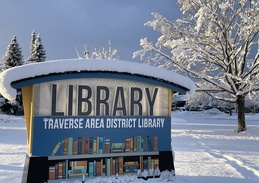Natural Gas
July 11, 2010
Natural gas: Will drilling create a big fracking problem?Last week, Northern Express covered a potential boom in natural gas
exploration, known as fracking (short for hydraulic fracturing), that
has some people excited over the money to be made, while others worry
about potential water contamination. This week, area
environmentalists—fractured over the Traverse City biomass
proposal—weigh in on this new issue.
By Anne Stanton
The controversy over natural gas fracking comes at a time when this
cleanest of the fossil fuels has emerged as an option in the energy
mix. Huge supplies are opening up across the country and prices are
down.
Wind energy entrepreneur Marty Lagina of Traverse City, featured in
last week’s Express article, wants to couple wind and natural gas. His
idea is to build a “smart” natural gas plant right next to a field of
wind turbines, which would kick on when the wind is low. The hybrid
power would solve wind’s greatest downside—its inability to provide
24/7 power, thus making it a real player in the power mix. A veteran
in the natural gas field, he said that water contamination is
extremely rare.
At the same time, Traverse City Light and Power has backed off
biomass gasification as an energy source due to concerns over air
pollution potentially causing respiratory problems and the impact on
Michigan forests (several biomass plants have been proposed in
Northern Michigan). TCL&P’s newest proposal is to analyze natural gas,
possibly renovating its aged peaker plant in Kalkaska County.
MORE PROBLEMS...
“Gas possesses many problems and is not a panacea. Water
contamination is just one problem. It being a fossil fuel is another
for me,” said Jim Carruthers, a TCL&P board member and veteran
activist who favored biomass because the wood supply is renewable.
“For the past 25 years the environmental community has been fighting
use of fossil fuels for energy and now all of a sudden they are
changing their tune because they don’t like biomass. Nothing is
perfect. Also, most of the gas leases were gobbled up by out of state
interests. Very few if any went to Michigan companies so it really
will do nothing toward boosting our economy. Just because it is there
does not mean it is good for us, the environment or the energy
industry. A handful of environmentalists are leading our community
astray with misinformation, which is most damaging.”
Jim Olson, one of the leading defenders of Michigan water, wasn’t
outspoken against biomass, although he doesn’t support it on a large
scale. But he is deeply fearful about fracking’s impact on the water
supply. He said that state and landowners, especially farmers, are
leasing oil and gas rights without knowing the full consequences.
They don’t realize that their rights are subordinate to the drilling
company when signing away their rights. Specifically, if the natural
gas driller needs groundwater to complete the fracking operation, the
property owner’s rights to that water come second—unless otherwise
specified in a lease.
“On top of this, the individual and cumulative effects and impacts
will pervasively affect adjacent landowners, lakes, and streams. I
don’t believe the state is looking out for the public’s interest in
water,” Olson said.
SEEK MORATORIUM
Olson feels that citizens and the state’s leaders must demand a
moratorium on any more leasing and permits until there has been a
complete and thorough investigation and determination of the effects
and cumulative impacts of hydraulic fracturing statewide.
M’Lynn Hartwell, also an environmental activist who opposed biomass,
supports Lagina’s idea of coupling natural gas and wind. She has also
suggested using biofuels from area farms. Does she still support the
idea with the environmental concerns over fracking?
“The short answer is yes, but the long answer would explain that we
need more regulation over the natural gas drilling industry and
accountability. Much more,” she said.
Fracking has actually been used commercially since 1949 in more than
one million wells by the natural gas and oil exploration and
production industry, including many shallow natural gas wells, she
said.
Most wells were managed properly and caused no significant harm to the
environment. But Michigan must absolutely assure that all
environmental protections are in place to protect air and water before
granting permits for fracking, which involves drilling at much greater
depths—up to two miles—using the tremendous pressure of millions of
gallons of water and close to 600 chemicals, several of them toxic.
“I believe if drillers were to have their license to operate in
Michigan suspended due to pollution from their carelessness, there
would be very few, if any, accidents.”
Hartwell also wants to force drillers to reuse their fracking fluid,
rather than consume millions of gallons of fresh water every time they
drill.
“Currently fresh water polluted with fracking fluids are disposed of
in deep injection wells. This takes our fresh water supply out of
natural systems, something that is a very ill advised idea,” she said.
STATE LAW
Drillers were exempted from the federal Safe Drinking Water Act during
the Bush administration. The good news is that three Michigan state
laws require drinking water protection, including the Water Resources
Act, the Environmental Response Act, and the Michigan Environmental
Protection Act, said Chris Grobbel, an environmental consultant.
Ed Timm, a chemical engineer who was heavily involved in stopping an
Alba injection well in the Jordan River Valley, said that the disposal
of fracking and brine water in injection wells will surely become an
issue because of the threat posed to rivers and streams.
Yet it’s unrealistic to believe that solar or wind—a favorite
alternative among environmentalists—can supplant coal in the
short-term. The huge jolt in energy costs would be catastrophic for
businesses and homes. Despite political promises, experts believe that
the transition to solar and wind will likely take about 100 years, he
said.
“The age of cheap power is over, and we have to look at conservation,
because power will cost four times as much. Conservation is important,
but when you live in Northern Michigan, you can only go so far. This
is an intensive energy climate to live in.
The natural gas and wind hybrid with low carbon and air pollution is
one that might work, but the state must think big picture as we
proceed to new energy sources, Olson said.
“It’s our natural gas,” he said. “It belongs to us. Why isn’t the
state leveraging it with conservation requirements. Why isn’t it
getting an assurance of stablized prices and a certain supply in
Michigan before selling these leases? We are not thinking big picture.
This planet is facing serious problems. We have to very carefully
articulate the public purposes and goals we are after—water, climate
change, purity of water. How do we get there?
“The BP disaster in the Gulf is a great example of why we must do
this. Putting it in our face as human beings that there are certain
areas that are so important to everyone that we have to drop the old
thinking about turning important public matters entirely into a highly
centralized private market mechanism.”
Timm said there are still things we can do as individuals, such as
choosing to build low-energy homes or improving the homes we have.
“Just for grins, I got out my ancient copy of my Whole Earth catalog
in 1968, and I was stunned by how current it is. How to make car fuel
out of French fry oil, solar and wind, earth bermed homes. We were on
the right track during the Jimmy Carter administration, and we didn’t
want to hear it.”
Trending

Winter Break at the Library
Trying to keep the kids busy while school is out? Head to the library! Dec. 22, take your 12+ tweens and teens to the Mesick… Read More >>
Umbo Is Coming...to The Little Fleet
Winter isn’t just coming—it’s already here. But if you want a break from the December blues, head to The L… Read More >>
GTB Starting the Year with Tradition
The Grand Traverse Band of Ottawa and Chippewa Indians hosts the Kchi Wiikwedong Anishinaabek Maawnjidowin Round Dance on Ja… Read More >>


